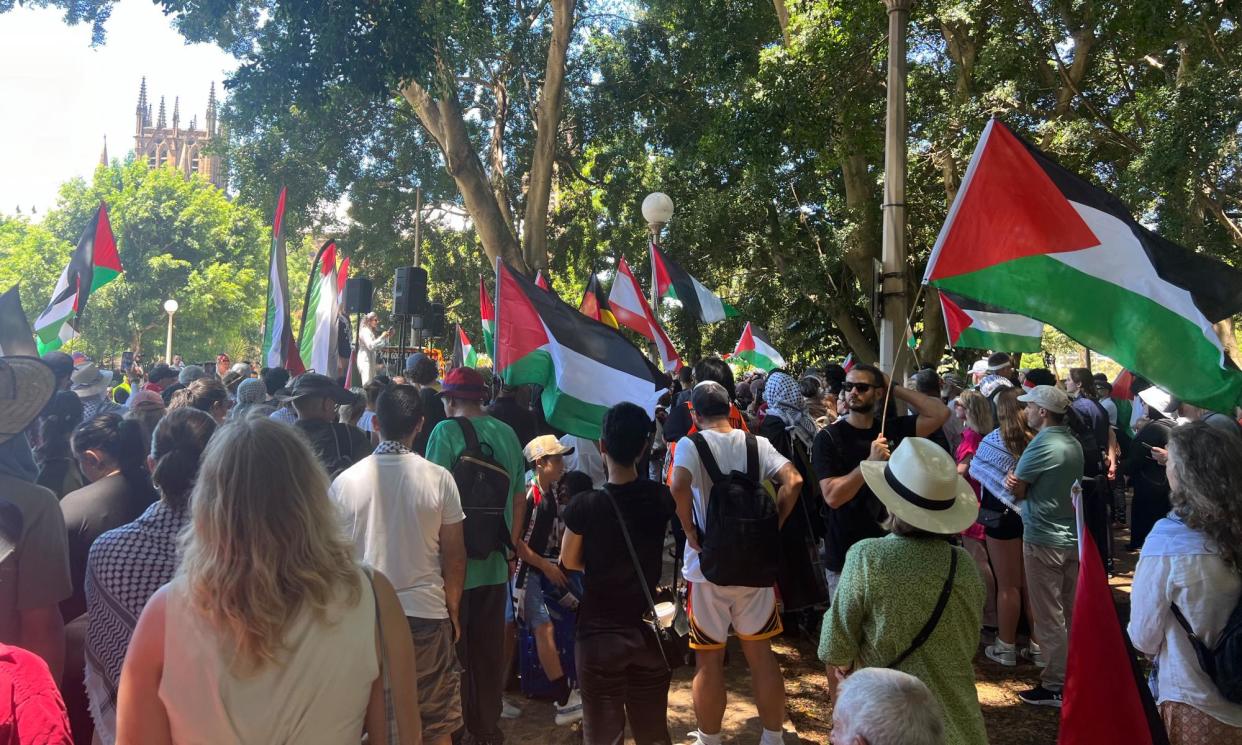Federal government challenged by NSW Labor members on Palestinian recognition

The New South Wales Labor conference has challenged the federal government over its position on Palestinian recognition, passing a motion calling for the government to recognise Palestine as a sovereign and independent state “as a priority”.
The motion will be seen as significant as the right faction controls the NSW branch of the Labor party, where previous motions passed by Labor branches, including Victoria, have been controlled by the left.
“It shows that we as a Labor Party recognise Palestinian sovereignty and that we will stand with Palestinian people,” the NSW MP for Bankstown, Jihad Dib, who moved the motion told delegates.
Dib’s speech and the passing of the motion soon after was met with a standing ovation by delegates.
Related: Australia, Canada and New Zealand leaders urge ceasefire in Gaza to end ‘catastrophic’ situation
Labor conference motions are not binding on the political arm of the party, but as the prime minister, Anthony Albanese’s, home state, the NSW branch is seen as particularly influential over federal government policy positions.
While the federal Labor government position on Palestine is to recognise it as a state, it contains conditions which link recognition to part of a peace process. The NSW conference motion calls on the government to recognise Palestine without those conditions.
It comes after the ACT Labor conference passed a similar motion, but with stronger wording on timing. It called on the federal government to recognise Palestine “immediately”.
Louisa Romanous, a member of Labor Friends of Palestine and member of Labor’s Parramatta branch, told delegates ahead of the motion passing that the government’s actions so far had been “ineffective compared to our response to the Russian invasion of Ukraine”.
“We want Australia to take all measures in their power to put pressure on Israel to prevent acts of genocide,” she told delegates. “Please stand with me to call on the Australian government to immediately unconditionally recognise the state of Palestine.”
The conference also adopted the Australia and the World policy committees report, which was prepared four weeks ahead of conference, and took in the views of rank and file Labor members on the government’s foreign policy.
The committee which prepared the report noted the action the Albanese government had taken on Palestine, which included adopting the official name “Occupied Palestinian Territories” consistent with the United Nations and reversing the Morrison government decision to recognise West Jerusalem as the capital of Israel.
Noting that the NSW Labor conference has “supported the recognition and right of Israel and Palestine to exist within secure and recognised borders” since 2014, the committee also noted that criticism of the Israeli government “particularly relating to Benjamin Netanyahu’s opposition to a two-state solution and rejection of any moves to establish a Palestinian state is not anti-Semitic and should not be seen as a fundamental criticism of Israel and its peoples”.
Related: Palestinian state recognition the only hope to end violence in Middle East, Penny Wong says
Labor members had hoped for action on humanitarian visas for Palestinians fleeing Israel’s military actions ahead of the conference and privately expressed “disappointment” Albanese and foreign minister, Penny Wong, had not moved to establish easier pathways.
Earlier this morning, Albanese rebuked pro-Palestinian protesters in his speech to the state conference, saying “we choose delivery and action over empty words”.
“Our members choose to help vulnerable people inside elected offices - not intimidate them outside,” he said in direct reference to anti-genocide protesters who have camped outside Labor MPs electorate offices for the best part of the last year.
Senior Labor figures had wanted the NSW conference to be a show of unity and had made attempts to quell discontent ahead of the conference votes, but members have publicly expressed anger, including some walking out during Albanese’s speech in protest of the government’s actions in relation to the construction arm of the CFMEU.


